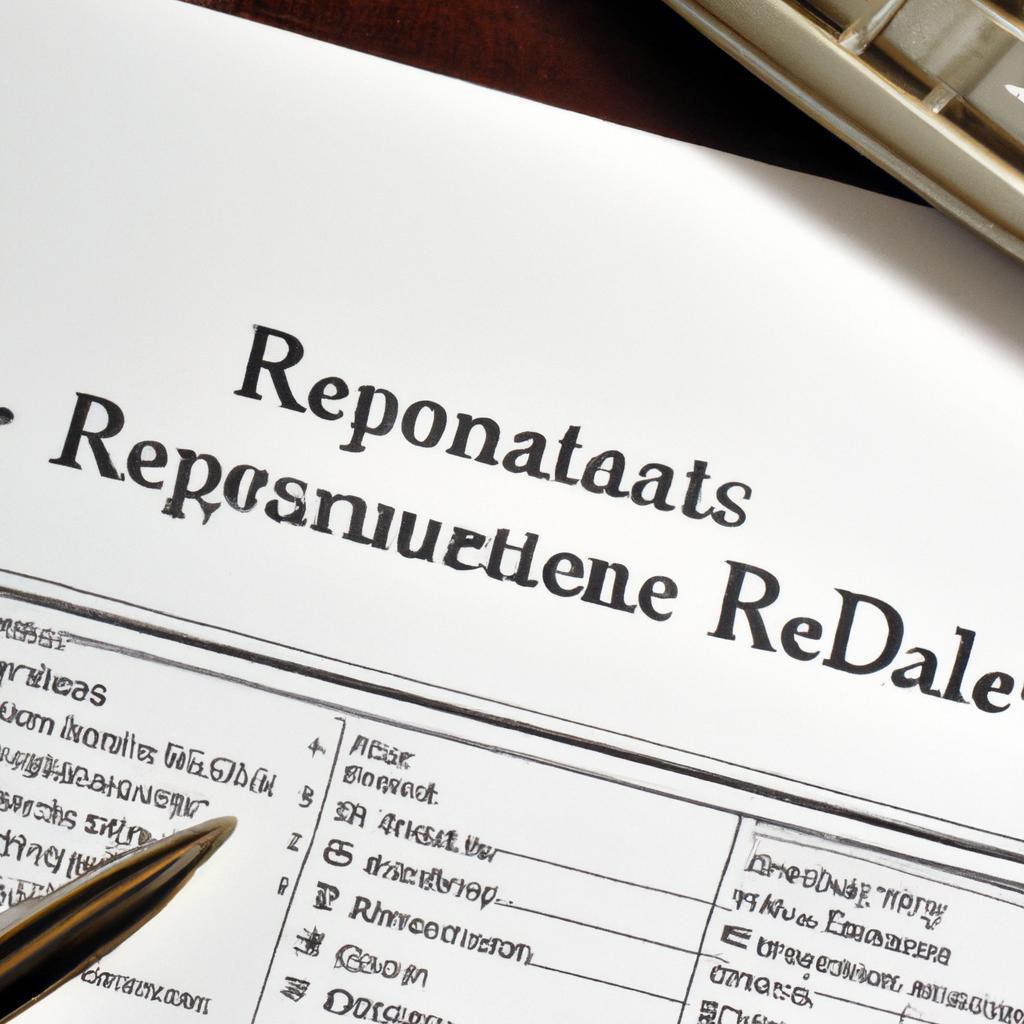In the intricate world of real estate transactions and property ownership, there exists a crucial entity that plays a pivotal role in maintaining public records and ensuring the integrity of property ownership – the Register of Deeds. As seasoned legal professionals at Morgan Legal Group in the bustling metropolis of New York City, we understand the nuances of navigating the complexities of property law. Join us as we delve into the intricacies of the Register of Deeds and explore its significance in the realm of real estate.
Understanding the Role of the Register of Deeds in Real Estate Transactions
The Register of Deeds plays a crucial role in real estate transactions by maintaining important records that establish ownership and legal interests in properties. This official government office is responsible for recording, indexing, and preserving a variety of real estate documents, including deeds, mortgages, liens, and other important paperwork. These records serve as a public record of property ownership and help ensure the integrity and transparency of real estate transactions.
When a property changes hands, the buyer’s deed must be recorded with the Register of Deeds to officially transfer ownership. This process helps establish a clear chain of title, which is essential for proving ownership and resolving disputes. Additionally, the Register of Deeds plays a key role in protecting property rights by providing a centralized location for recording and accessing important documents related to real estate transactions. It is important for individuals involved in real estate transactions to understand the functions and responsibilities of the Register of Deeds to ensure that their rights and interests are properly protected.
Navigating the Responsibilities and Duties of the Register of Deeds
The Register of Deeds plays a crucial role in the administration of property records and documents within a specific jurisdiction. It is their duty to maintain accurate and up-to-date records of real estate transactions, including deeds, mortgages, and liens. These records serve as a valuable resource for individuals and businesses looking to establish or verify ownership of property. The Register of Deeds also oversees the process of recording and indexing these documents, ensuring that they are easily accessible to the public.
- Recording property transactions
- Indexing records for easy access
- Maintaining accurate and up-to-date records
- Providing public access to property documents
| Responsibilities | Duties |
|---|---|
| Recording property transactions | Ensure accuracy and completeness of records |
| Indexing records | Organize documents for easy retrieval |
| Providing public access | Assist individuals in locating property documents |
Overall, the Register of Deeds serves as a vital link between property owners, buyers, and sellers, ensuring that the transfer of real estate is conducted smoothly and legally. Their expertise in property law and attention to detail are essential in maintaining the integrity of property records and upholding the public trust.

Examining the Importance of Document Recording and Preservation by the Register of Deeds
Document recording and preservation by the Register of Deeds plays a crucial role in ensuring the integrity and security of property ownership records. The Register of Deeds is responsible for maintaining accurate and up-to-date records of all land transactions within their jurisdiction. This includes deeds, mortgages, liens, and other important documents that establish ownership and encumbrances on real property.
One of the key reasons why document recording and preservation is essential is to provide a clear chain of title for each property. By diligently recording and preserving all relevant documents, the Register of Deeds helps to prevent disputes over ownership and ensures that property rights are protected. Additionally, properly recorded documents serve as a valuable source of information for homeowners, real estate professionals, and title companies when conducting due diligence on a property.

Ensuring Compliance and Accuracy in Property Records through the Register of Deeds
The Register of Deeds is an essential entity responsible for ensuring compliance and accuracy in property records. This office plays a crucial role in maintaining public records related to real estate transactions, deeds, mortgages, and other important documents. By meticulously recording and indexing these records, the Register of Deeds helps to protect the rights of property owners and promote transparency in the real estate market.
One of the key functions of the Register of Deeds is to verify the authenticity of documents submitted for recording. This involves carefully examining each document to ensure that it meets all legal requirements and accurately reflects the details of the transaction. By conducting thorough reviews and enforcing strict compliance standards, the Register of Deeds helps to prevent fraud, errors, and disputes that could jeopardize the integrity of property records. In addition, the office also plays a vital role in providing access to records and information to the public, promoting accountability and trust in the real estate industry.
| Date | Document Type | Value |
|---|---|---|
| 01/15/2021 | Deed | $500,000 |
| 02/25/2021 | Mortgage | $300,000 |
| 03/10/2021 | Property Transfer | $700,000 |
Q&A
Q: What is the register of deeds?
A: The register of deeds is a government office responsible for recording and maintaining real estate documents, such as deeds, mortgages, and liens.
Q: Why is the register of deeds important?
A: The register of deeds ensures that property ownership is accurately recorded and easily accessible to the public. This helps protect property rights and prevent disputes.
Q: How does the register of deeds differ from a title company?
A: While a title company provides insurance to protect against title defects, the register of deeds is a government agency that officially records and stores property documents.
Q: Can anyone access the records kept by the register of deeds?
A: Yes, the records kept by the register of deeds are public documents that can be accessed by anyone for a nominal fee. This transparency helps promote trust and accountability in real estate transactions.
Q: What kinds of documents can be found at the register of deeds?
A: The register of deeds typically houses documents related to property ownership, including deeds, mortgages, easements, and liens. These documents provide a comprehensive history of a property’s ownership and legal status.
Q: How does the register of deeds contribute to the real estate industry?
A: By maintaining accurate and up-to-date property records, the register of deeds plays a crucial role in facilitating real estate transactions and ensuring the integrity of the property market. Their work helps streamline the process of buying, selling, and transferring property.
Key Takeaways
In conclusion, the register of deeds is a fundamental office responsible for recording and maintaining important documents related to real estate transactions. From property deeds to mortgages, this office plays a crucial role in ensuring transparency and accuracy in property ownership. Next time you buy or sell a piece of real estate, remember the register of deeds and the important work they do behind the scenes. Understanding the role of this office can help streamline the real estate process and protect your property rights. Thank you for reading and expanding your knowledge on the register of deeds.
 Understanding the role and responsibilities of local government offices can be overwhelming for many people. One such office that is often shrouded in mystery is the Register of Deeds. Many folks are not even aware of its existence, let alone its functions. In this article, we will demystify the Register of Deeds and explore its various functions, benefits, and practical tips. So, without further ado, let’s dive in.
Understanding the role and responsibilities of local government offices can be overwhelming for many people. One such office that is often shrouded in mystery is the Register of Deeds. Many folks are not even aware of its existence, let alone its functions. In this article, we will demystify the Register of Deeds and explore its various functions, benefits, and practical tips. So, without further ado, let’s dive in.
What is the Register of Deeds?
The Register of Deeds (ROD) is a government office responsible for storing, maintaining, and providing access to public land records, property documents, and other related information. Each state in the US has its own ROD office, and the official who oversees its operations is known as the Register of Deeds or County Recorder. The office is typically located at the county level and is a vital part of the local government structure.
What does the Register of Deeds do?
The Register of Deeds is responsible for a wide range of important functions, all of which revolve around the recording and preservation of land and real estate records. The office acts as a hub for transactions related to land transfers, mortgages, liens, and other legal documents.
Some of the most common tasks performed by the ROD include:
1. Recording and storing documents: The primary function of the Register of Deeds is to record and maintain public land records. These documents can include property deeds, mortgages, liens, and property maps. The office keeps a record of all these documents for future reference and access.
2. Processing and issuing marriage licenses: In many states, the Register of Deeds is also responsible for issuing marriage licenses. This task involves verifying the age, identity, and marital status of the individuals applying for a marriage license.
3. Collecting and maintaining fees: The ROD office collects various fees for maintaining public records, issuing marriage licenses, and conducting other services. These fees are then used to fund the operations of the office.
4. Providing public access to records: One of the primary roles of the Register of Deeds is to provide public access to county records. The office maintains a record index that allows individuals to search for specific documents by name, date, or property type. This information can be used by individuals, businesses, and government agencies for legal, historical, and research purposes.
5. Verification of documents: When buying or selling a property, it is essential to ensure that all the documents are accurate and up to date. The Register of Deeds plays a crucial role in this process by verifying the authenticity and accuracy of land records and legal documents.
Benefits of the Register of Deeds
The Register of Deeds office offers numerous benefits to the public. Some of these include:
1. Protecting property rights: By maintaining an accurate and up-to-date record of land and property transactions, the Register of Deeds helps protect the property rights of individuals and businesses. This information is vital in resolving any disputes that may arise in the future.
2. Ensuring transparency: The ROD office promotes transparency by making public records easily accessible to all. This information is available to anyone, and it helps ensure fair and equal treatment in property transactions.
3. Facilitating efficient property transactions: The Register of Deeds plays a crucial role in facilitating a smooth and efficient process for property transactions. By maintaining an accurate record of land and property ownership, the office makes it easier for individuals and businesses to buy, sell, and transfer ownership of real estate.
Practical Tips for Working with the Register of Deeds
Working with the Register of Deeds can be a daunting task, especially if you are unfamiliar with the processes and procedures. Here are some practical tips to help you navigate the ROD smoothly:
1. Research before you visit: Before heading to the ROD office, do some research on the specific county’s website. You can find information on fees, forms, and other necessary details that may save you time and effort in person.
2. Properly prepare your documents: Make sure that all the documents you present to the ROD are complete, accurate, and properly notarized. Improperly prepared documents may lead to delays or rejections, which can be frustrating and costly.
3. Be patient and polite: The ROD office can be a busy and crowded place, and it may take some time to get your work done. Be patient and courteous, and you’ll receive better service from the office staff.
First-Hand Experience
I recently had to visit the Register of Deeds office to transfer ownership of a property. The process was much smoother than I had expected, thanks to the helpful staff and easy-to-use online resources. I was able to get all the necessary documents and fees ready beforehand, which saved me a lot of time and hassle. Overall, my experience with the ROD was positive, and I would definitely recommend it to anyone looking to buy or sell a property.
In conclusion, the Register of Deeds is an essential government office that plays a crucial role in maintaining and providing access to property records. Its functions, benefits, and practical tips make it an indispensable resource for anyone involved in property transactions. By understanding the role of the ROD and following the tips mentioned above, you can make your experience with the office much smoother and more efficient.

